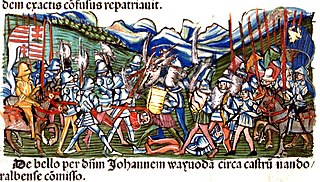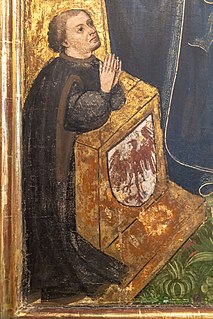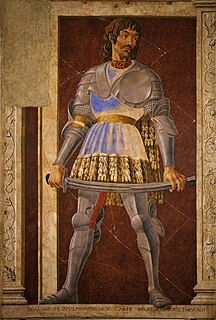 W
WCardinal Henry Beaufort, Bishop of Winchester, was an English prelate and statesman who held the offices of Bishop of Lincoln (1398) then Bishop of Winchester (1404) and was from 1426 a Cardinal of the Church of Rome. He served three times as Lord Chancellor and played an important role in English politics.
 W
WJan Čapek ze Sán was a Czech Hussite noble, general of Władysław III of Poland.
 W
WČeněk of Wartenberg was a commander of the Royalist Bohemian forces at the start of the Hussite Wars. Up until the first half of 1420 he was a commander of the Utraquist League, a moderate fraction of the Hussite movement. As a result of severe atrocities committed by Taborites, members of the more radical part of this movement, he returned to the royalist/Catholic side.
 W
WFrederick I, the Belligerent or the Warlike, a member of the House of Wettin, ruled as Margrave of Meissen from 1407 and Elector of Saxony from 1423 until his death.
 W
WFrederick was the last Burgrave of Nuremberg from 1397 to 1427, Margrave of Brandenburg-Ansbach from 1398, Margrave of Brandenburg-Kulmbach from 1420, and Elector of Brandenburg from 1415 until his death. He became the first member of the House of Hohenzollern to rule the Margraviate of Brandenburg.
 W
WProkop the Great or Prokop the Bald or the Shaven was a Czech Hussite general and a prominent Taborite military leader during the Hussite Wars. On his mother's side, he came from a German patrician family living in Prague.
 W
WHynek Krušina of Lichtenburg was a Hussite commander and governor and lien holders of the County of Kladsko, the Duchy of Münsterberg and the city of Ząbkowice Śląskie.
 W
WJohn was the Count Palatine of Neumarkt from 1410 to his death. The son of Rupert III of the Palatinate, he married Catherine of Pomerania in 1407. He is mainly known for his crushing victory against the Hussites at the Battle of Hiltersried in 1433.Christopher, his son, was king of the Kalmar Union.
 W
WSigismund Korybut was a duke from the Gediminid dynasty, best known as a military commander of the Hussite army and a governor of Bohemia and Prague during the Hussite Wars.
 W
WPope Martin V, born Otto Colonna, was the head of the Catholic Church and ruler of the Papal States from 11 November 1417 to his death in 1431. His election effectively ended the Western Schism in 1378–1417.
Zbigniew Oleśnicki, known in Latin as Sbigneus, was a high-ranking Roman Catholic clergyman and an influential Polish statesman and diplomat. He served as Bishop of Kraków from 1423 until his death in 1455. He took part in the management of the country's most important affairs, initially as a royal secretary under King Władysław II Jagiełło and later as the effective regent during King Władysław III's minority. In 1439 he became the first native Polish cardinal.
 W
WFilippo Buondelmonti degli Scolari, known as Pippo Spano, was an Italian magnate, general, strategist and confidant of King Sigismund of Hungary, born in the Republic of Florence. The personal friend of Sigismund and member of the Order of the Dragon, he was buried in the Székesfehérvár Basilica beside the Hungarian kings.
 W
WSigismund of Bohemia, also known as Sigismund of Luxembourg, was prince-elector of Brandenburg from 1378 until 1388 and from 1411 until 1415, king of Hungary and Croatia from 1387, king of Germany from 1411, king of Bohemia from 1419, king of Italy from 1431, and Holy Roman Emperor from 1433 until 1437, and the last male member of the House of Luxembourg.
 W
WSophia of Bavaria was a Queen of Bohemia and the spouse of Wenceslaus, King of Bohemia and King of the Romans. She was briefly interim regent of Bohemia after the death of Wenceslaus in 1419.
 W
WVytautas, also known as Vytautas the Great from the 15th century onwards, was a ruler of the Grand Duchy of Lithuania, which chiefly encompassed the Lithuanians and Ruthenians. He was also the Prince of Grodno (1370–1382), Prince of Lutsk (1387–1389), and the postulated king of the Hussites.
 W
WWenceslaus IV, also known as Wenceslaus of Luxembourg, was King of Bohemia from 1378 until his death and King of Germany from 1376 until he was deposed in 1400. He belonged to the House of Luxembourg.
 W
WWładysław III, also known as Władysław of Varna, was King of Poland and the Supreme Duke of Grand Duchy of Lithuania from 1434 and King of Hungary and Croatia from 1440 until his death at the Battle of Varna. He was the eldest son of Władysław II Jagiełło, King of Poland and Grand Duke of Lithuania, and the Lithuanian noblewoman Sophia of Halshany.
 W
WJan Želivský was a prominent Czech priest during the Hussite Reformation.
 W
WJan Žižka z Trocnova a Kalicha was a Czech general – a contemporary and follower of Jan Hus and a Radical Hussite who led the Taborites. Žižka was a successful military leader and is now a Czech national hero. He was nicknamed "One-eyed Žižka", having lost one and then both eyes in battle. Jan Žižka led Hussite forces against three crusades and never lost a single battle despite being completely blind in his last stages of life.